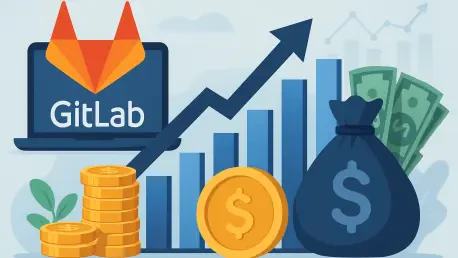In the rapidly evolving landscape of technology and software development, GitLab stands out as a notable contender. Serving as a comprehensive DevOps platform, GitLab offers a suite of tools designed to enhance collaborative software development. With its recent stock performance capturing the attention of investors, GitLab’s valuation and growth prospects are under scrutiny. The company has seen its stock price recover from a 52-week low, currently hovering around $45. While this rebound has reassured some investors, GitLab’s high forward and trailing price-to-earnings ratios expose the heightened expectations for its market growth. These metrics render an intriguing picture of the company’s potential amid AI advancements and competitive pressures.
The Financial Metrics Behind GitLab’s Rise
Assessing GitLab’s Financial Health and Market Position
GitLab’s recent financial performance showcases both solid revenue growth and a path towards profitability. The company has reported over 25% year-over-year revenue growth, indicating robust financial health and reinforcing confidence among analysts. This sustained growth trend aligns with its strategic efforts in leveraging AI technologies, promising enhanced efficiency and innovation. Despite achieving positive free cash flow, approximately $0.03 per share, the valuation remains steep. The discrepancy between high valuation and steady financial numbers prompts investors to weigh GitLab’s growth potential against its current market price.
Analyst sentiments largely remain positive, often rating GitLab stock as a strong buy, with price targets exceeding $60. These evaluations are influenced by GitLab’s operational momentum and strategic AI integrations, believed to propel future success. Nevertheless, some investors approach with caution, mindful of the elevated valuation metrics amid the volatile tech sector. While acknowledging the promising revenue trajectory, they remain tentative as to whether these factors alone can fulfill the growth anticipations baked into the current valuation.
The Role of Competition in Shaping GitLab’s Market Dynamics
GitLab operates within a crowded field alongside prominent players such as Atlassian, GitHub, and CircleCI. Its all-in-one DevOps platform distinguishes itself by offering streamlined solutions for software version control, collaboration, and project management. This differentiation is vital in maintaining its competitive edge. With competitors continuously enhancing their service offerings, GitLab’s market positioning must remain agile and forward-thinking. The integration of AI and machine learning within its platform is a strategic move aimed at improving user experience and enhancing operational capabilities.
Despite GitLab’s promising technological advancements, industry competition serves as a persistent challenge. Competitors with established customer bases and diverse product portfolios pose significant hurdles. This necessitates a focus on innovation to ensure GitLab remains attractive to developers and enterprise clients. The ability to provide superior functionality and user-friendly solutions will play a crucial role in retaining and expanding its customer base. Successfully navigating these competitive pressures will be central to maintaining investor confidence and realizing its projected growth trajectory.
Future Prospects and Strategic Pathways
Strategic Initiatives Leading GitLab’s Forward Momentum
Anticipated strategic initiatives centered around AI and machine learning are set to further bolster GitLab’s growth outlook. These technologies promise to enhance user experience by automating repetitive tasks, optimizing project workflows, and improving code quality. The focus on AI not only aims to streamline development processes but also seeks to elevate the platform’s overall functionality. GitLab’s commitment to these advancements illustrates its vision of evolving alongside industry trends, prompting optimism regarding its future trajectory.
Additionally, GitLab’s engagement in collaborative partnerships and expanding its developer ecosystem signifies proactive efforts to strengthen its market presence. Such alliances can foster innovation, extend product capabilities, and appeal to a broader audience. This commitment to collaboration, combined with its technology-driven approach, portrays a resilient strategy aimed at sustaining long-term growth. While challenges remain, these initiatives symbolize GitLab’s adaptability and its desire to remain a formidable player in the DevOps arena.
Investors’ Perspectives and Considerations
Retail investors examining GitLab’s potential are drawn to its consistent revenue growth and strategic technology adoption. Monitoring analyst sentiments and quarterly earnings reports becomes crucial to understanding the stock’s alignment with market expectations. Despite its attractive growth story, GitLab’s lofty valuation raises important questions about its sustainable upside potential. Investors must carefully assess whether the anticipated growth justifies the current valuation or if market corrections loom on the horizon.
The debate on GitLab’s investment prospects highlights the need to balance optimism in technology advancement with realistic financial assessments. Revenue growth remains vital for enhancing shareholder value, while AI integrations are seen as vital drivers of future profitability. As the company navigates forthcoming challenges, its ability to adapt to industry changes will define its investment appeal. Whether GitLab can consistently deliver on its growth promises will likely determine its stature within the broader investment community.
Strategic Actions and Investment Implications
In today’s fast-paced world of tech and software development, GitLab emerges as a significant player. As a complete DevOps platform, it provides a comprehensive set of tools that foster collaborative software creation. GitLab’s recent stock performance has captured the attention of investors, as its valuation and growth potential are under the microscope. The stock has made a comeback from its 52-week low, now around $45, which has restored some investor confidence. However, GitLab’s high forward and trailing price-to-earnings ratios reflect lofty market growth expectations. These figures paint an intriguing picture of the company’s future, especially in the context of AI advancements and rising competition. GitLab’s position in the evolving technology landscape is indicative of its potential to influence industry standards, yet it also faces pressures from peers and the broader market. The balancing act between innovation and market demands will determine how GitLab navigates the challenges and opportunities of the future.









